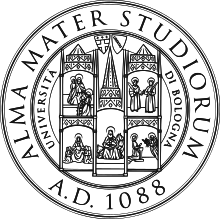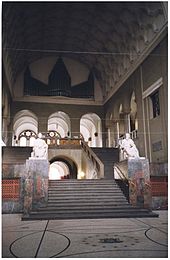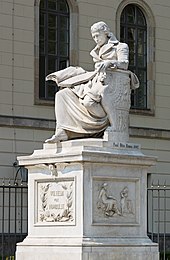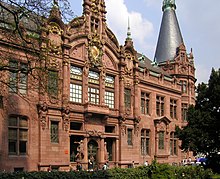University
![]()
This article or paragraph presents the situation in Germany. Help describe the situation in other countries.
Universities (from the Latin universitas magistrorum et scolarium, "community of teachers and pupils", later in Humboldt's sense for universitas litterarum, "totality of the sciences") are higher education institutions with the right to award doctorates, which serve the cultivation and development of the sciences through research, teaching and study, but are also intended to provide their students with practice-oriented professional qualifications. In addition to the full universities, which offer a wide range of subjects (universality) and can have several tens of thousands of students (mass university), there are also smaller state and private universities, which are usually specialized in a few subjects, and whose number of enrollees tends to be in the four-digit range.
The oldest university in the world in the modern sense is commonly counted as the University of Bologna (1088) in Italy (a prototype was the School of Salerno), whereas the University of Heidelberg (1386) is the oldest in Germany, the University of Vienna (1365) the oldest in Austria, and the University of Basel (1460) the oldest in Switzerland. Oxford University (c. 1096) is the oldest English university, and Harvard University (1636) is the oldest in the United States.

Seal of the University of Bologna

The School of Athens, Raphael Santi, 1510/1511, Vatican Stanzas, Rome

University of Cambridge, Corpus Christi College

Doctorate certificate of the University of Prague from 1905

Staircase in the main building of the Ludwig-Maximilians-University Munich

Monument to Wilhelm von Humboldt in front of the Humboldt University in Berlin

The University of Heidelberg is Germany's oldest university and is generally regarded as one of the best in Europe.
.jpg)
The University of Oxford is the oldest university in the English-speaking world and one of the most prestigious in the world.
Term
The term university (from the Latin universitas 'totality') characterizes in the field of science quite generally a comprehensive educational institution. At the then newly founded institutions of Bologna (founded in 1088), Paris (founded around 1150) or Oxford (founded in the 12th century), students studied in the modern sense of a Studium generale. This involved a still manageable number of scientific disciplines (septem artes liberales 'Seven Liberal Arts', supplemented by theology, jurisprudence and medicine). The totality of these sciences was later subsumed under the designation universitas litterarum ('totality of the sciences'). It was above all Wilhelm von Humboldt, who made the unity of teaching and research the basic principle of university work, who coined this term for the modern university. In addition, the original understanding of universitas, which had grown out of the corporate forms of organisation of medieval teaching and learning communities (universitas magistrorum et scholarium 'community of teachers and learners') in the area of important ecclesiastical centres of education, receded somewhat into the background. However, it lives on in the concept of the autonomy of universities.
With the increasing differentiation and proliferation of scientific fields, the term "university", which is linked to the Studium generale, has outlived its usefulness, since today no single institution can represent the entirety of the sciences. In this respect, the term university can only be meaningfully used for the totality of all, largely specialized, institutions of higher education. The term "university", which is used to refer to the academic community, has also lost its original place of application and has expanded its meaning, since this meaning applies to all institutions of higher education, including, for example, universities of applied sciences.
Characteristics and tasks
Since the European Middle Ages, the concept of the university has been shaped by the following factors
- the community of teachers and learners (universitas magistrorum et scholarium),
- the right to self-administration with the possibility of independent creation and execution of curricula and research projects (academic freedom) as well as
- the privilege of conferring publicly recognised academic degrees (for example, diploma or doctorate).
It is also essential that students put together their own timetable and that it is not predetermined as it is at a school or university of applied sciences.
Universities in the German-speaking world offer training courses according to the International Standard Classification of Education (ISCED), the UNESCO system for classifying education systems, at levels 5 and 6. They belong to the tertiary education sector.
The first universities in Europe were founded in the High Middle Ages. With the emergence of the universities, the monopoly of the monasteries on teaching and knowledge was broken. Nevertheless, university teaching, especially in Central and Northern Europe, was still influenced by the ecclesiastical orders and the clergy until well beyond the beginning of the modern era.
Since the establishment of the Berlin University in 1810 (called Humboldt University since 1949), the Humboldtian model of the unity of research and teaching has also prevailed internationally, which states that teachers should also conduct research in addition to their teaching activities, so that the high level of teaching is maintained and scientific qualifications can be better imparted to students.
Universities are generally characterised by a broader range of subjects. This characteristic applies above all to the so-called "mass universities". The aim is to offer diversity (diversitas) under the roof of an institutional unit (unitas). Typical are the classical faculties of philosophy (humanities, today also the philological and historical subjects), medicine, theology and law, which were already introduced in the Middle Ages. In addition, there are the natural sciences - which were taught as a branch of philosophy until the Renaissance, as was mathematics - as well as economics and social sciences, and other fields of work.
Some universities have thematic focuses such as technology and also represent this in the name (example: RWTH Aachen). Some universities, such as the universities of teacher education, which have the same status, use the designation "university" in their subtitle for better identification, especially in international correspondence. The former colleges of agricultural science and forestry have generally been merged with classical universities, so that these engineering courses are now offered at universities.
Art colleges are artistic and artistic-scientific institutions of higher education that are on an equal footing with universities. In addition to art colleges in the narrower sense, whose subject areas include the fine arts, visual communication and architecture, they also include colleges of music, drama and film.
In some cases, sports universities such as the German Sports University Cologne are also referred to as "sports universities".
The concept of the comprehensive university, which was implemented at several study locations in North Rhine-Westphalia and in Kassel (Hesse), provided for an integration of the university of applied sciences and university study programmes. The last enrolments were possible in the winter semester 2005/2006 in North Rhine-Westphalia. The Higher Education Act of Hesse stipulates that enrolment for Bachelor's and Master's degree courses at universities requires an Abitur or Fachhochschulreife.
A special feature is the principle of the distance university, which offers a course of study with the help of teaching material delivered in writing to the student's place of residence (in contrast to the presence university). This offer is mostly used by students who have already completed a course of study, who have a family or children, or who are already in professional life. Prisoners can also study at the distance university.
There are two universities of the Bundeswehr (UniBw) in Germany, one in Munich and one in Hamburg. The majority of all Bundeswehr officer candidates study at one of these universities, which can cover almost the entire range of subjects required by the Bundeswehr. These are mainly technical subjects, but also economics and organizational science as well as education. At the University of the Federal Armed Forces in Munich, it is also possible to obtain degrees from universities of applied sciences. The officer candidates of the medical service who study medicine, dentistry, veterinary medicine or pharmacy attend regular civilian universities. (see also History of the former officer colleges of the GDR).
Another new concept in Germany is the foundation university, which was at least partially implemented at three universities in Lower Saxony (Göttingen, Lüneburg, Hildesheim) until 2005. The basic idea is to provide the university with endowment capital from which the university is financed. This is intended to free the universities from state constraints and make them more flexible in their decisions. Traditionally, this model already exists in the United States of America. The best-known universities there have a very large endowment capital, which results primarily from their own business income and inheritances as well as private donations.
Increasingly, private universities are also being founded in Germany. Smaller foundation and private universities, as they traditionally exist in the Anglo-American area, occasionally have to struggle with the problem of becoming too financially dependent on a particular sponsor. In addition, tuition fees constitute a further source of funding in considerable amounts, which can lead to financial selection among prospective students.
Citizens' Universities and Children's Universities are temporary events that are part of a university's public relations work. They are intended to make university life transparent for children and non-academics and to promote the interests of universities.
The German University in Cairo (GUC) in Cairo/Egypt is currently the world's largest project in the field of education supported by Germany. For Germany's activities abroad in this field, see also Chinese-German University College.
Historically, medieval educational institutions in non-European countries (in Africa and Asia, especially in the Islamic world) are also referred to as universities, which do not fulfil all the characteristics of a European university (see also madrasa). The awarding of academic degrees in particular is to be regarded as a specifically European invention.
Educational institutions of antiquity, for example in ancient Egypt and Greece or in the Roman Empire, are not usually referred to as universities, although corresponding terms were also common at the time.
Search within the encyclopedia